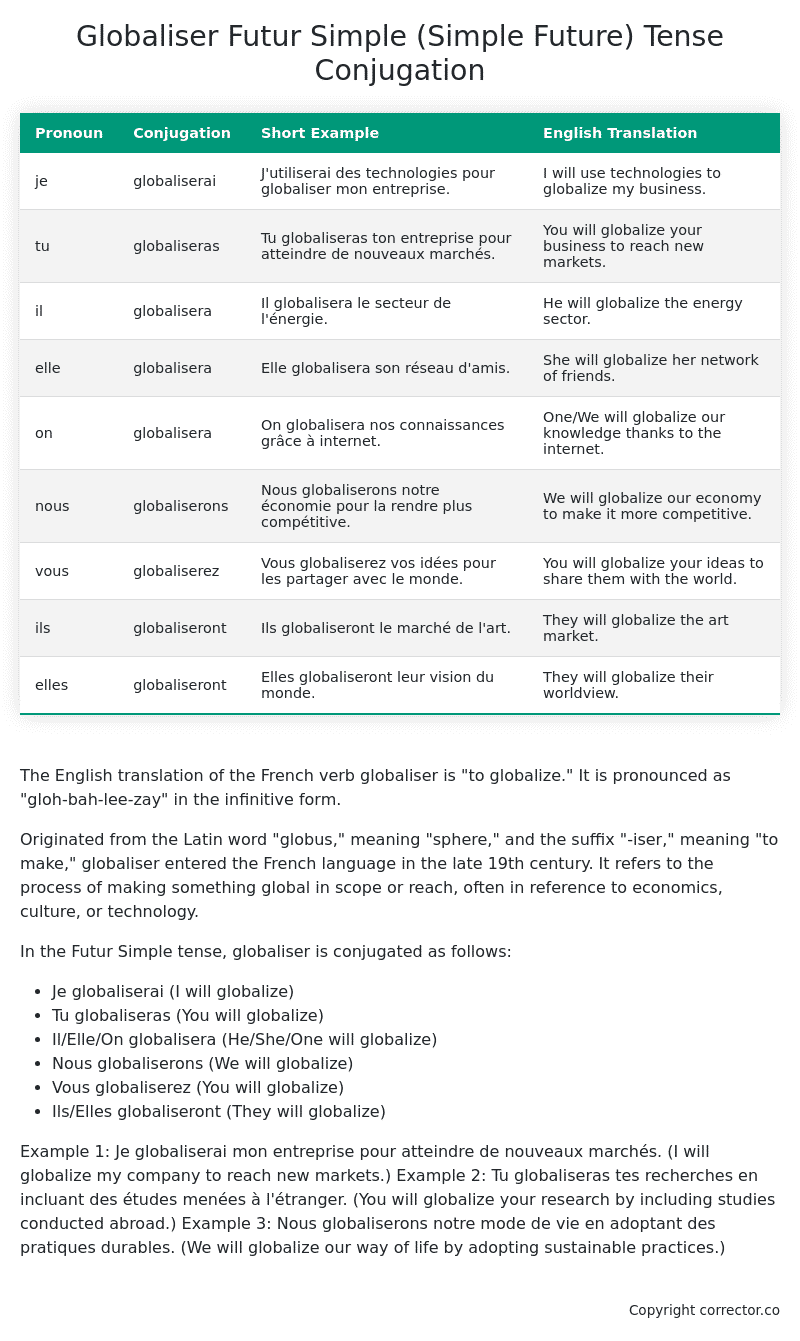Futur Simple (Simple Future) Tense Conjugation of the French Verb globaliser
Introduction to the verb globaliser
The English translation of the French verb globaliser is “to globalize.” It is pronounced as “gloh-bah-lee-zay” in the infinitive form.
Originated from the Latin word “globus,” meaning “sphere,” and the suffix “-iser,” meaning “to make,” globaliser entered the French language in the late 19th century. It refers to the process of making something global in scope or reach, often in reference to economics, culture, or technology.
In the Futur Simple tense, globaliser is conjugated as follows:
- Je globaliserai (I will globalize)
- Tu globaliseras (You will globalize)
- Il/Elle/On globalisera (He/She/One will globalize)
- Nous globaliserons (We will globalize)
- Vous globaliserez (You will globalize)
- Ils/Elles globaliseront (They will globalize)
Example 1: Je globaliserai mon entreprise pour atteindre de nouveaux marchés. (I will globalize my company to reach new markets.)
Example 2: Tu globaliseras tes recherches en incluant des études menées à l’étranger. (You will globalize your research by including studies conducted abroad.)
Example 3: Nous globaliserons notre mode de vie en adoptant des pratiques durables. (We will globalize our way of life by adopting sustainable practices.)
Table of the Futur Simple (Simple Future) Tense Conjugation of globaliser
| Pronoun | Conjugation | Short Example | English Translation |
|---|---|---|---|
| je | globaliserai | J’utiliserai des technologies pour globaliser mon entreprise. | I will use technologies to globalize my business. |
| tu | globaliseras | Tu globaliseras ton entreprise pour atteindre de nouveaux marchés. | You will globalize your business to reach new markets. |
| il | globalisera | Il globalisera le secteur de l’énergie. | He will globalize the energy sector. |
| elle | globalisera | Elle globalisera son réseau d’amis. | She will globalize her network of friends. |
| on | globalisera | On globalisera nos connaissances grâce à internet. | One/We will globalize our knowledge thanks to the internet. |
| nous | globaliserons | Nous globaliserons notre économie pour la rendre plus compétitive. | We will globalize our economy to make it more competitive. |
| vous | globaliserez | Vous globaliserez vos idées pour les partager avec le monde. | You will globalize your ideas to share them with the world. |
| ils | globaliseront | Ils globaliseront le marché de l’art. | They will globalize the art market. |
| elles | globaliseront | Elles globaliseront leur vision du monde. | They will globalize their worldview. |
Other Conjugations for Globaliser.
Le Present (Present Tense) Conjugation of the French Verb globaliser
Imparfait (Imperfect) Tense Conjugation of the French Verb globaliser
Passé Simple (Simple Past) Tense Conjugation of the French Verb globaliser
Passé Composé (Present Perfect) Tense Conjugation of the French Verb globaliser
Futur Simple (Simple Future) Tense Conjugation of the French Verb globaliser (this article)
Futur Proche (Near Future) Tense Conjugation of the French Verb globaliser
Plus-que-parfait (Pluperfect) Tense Conjugation of the French Verb globaliser
Passé Antérieur (Past Anterior) Tense Conjugation of the French Verb globaliser
Futur Antérieur (Future Anterior) Tense Conjugation of the French Verb globaliser
Subjonctif Présent (Subjunctive Present) Tense Conjugation of the French Verb globaliser
Subjonctif Passé (Subjunctive Past) Tense Conjugation of the French Verb globaliser
Subjonctif Imparfait (Subjunctive Imperfect) Tense Conjugation of the French Verb globaliser
Subjonctif Plus-que-parfait (Subjunctive Pluperfect) Tense Conjugation of the French Verb globaliser
Conditionnel Présent (Conditional Present) Tense Conjugation of the French Verb globaliser
Conditionnel Passé (Conditional Past) Tense Conjugation of the French Verb globaliser
L’impératif Présent (Imperative Present) Tense Conjugation of the French Verb globaliser
L’infinitif Présent (Infinitive Present) Tense Conjugation of the French Verb globaliser
Struggling with French verbs or the language in general? Why not use our free French Grammar Checker – no registration required!
Get a FREE Download Study Sheet of this Conjugation 🔥
Simply right click the image below, click “save image” and get your free reference for the globaliser Futur Simple tense conjugation!

Globaliser – About the French Futur Simple (Simple Future) Tense
Formation of Futur Simple
For regular -er verbs (e.g., parler – to speak)
For regular -ir verbs (e.g., finir – to finish)
For regular -re verbs (e.g., vendre – to sell)
Common Everyday Usage Patterns
Conditional Statements
Interactions with Other Tenses
Futur Antérieur
Conditional
Present
Summary
I hope you enjoyed this article on the verb globaliser. Still in a learning mood? Check out another TOTALLY random French verb conjugation!


